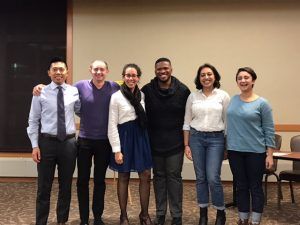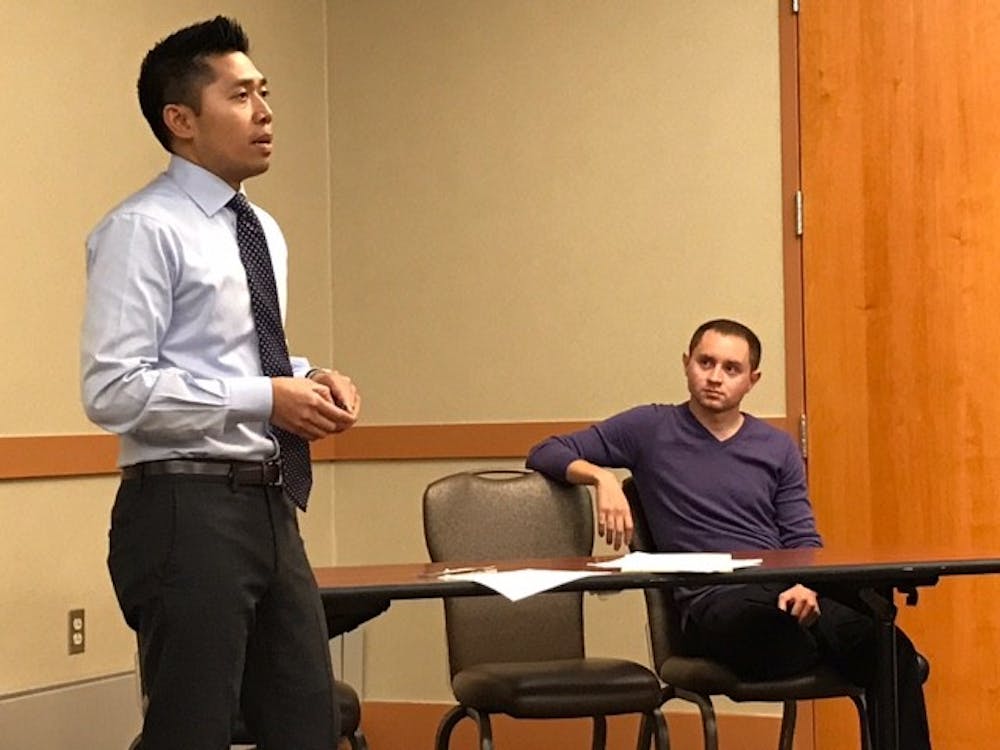LGBTQ Life at JHU and Johns Hopkins Organización Latina Estudiantil (OLÉ) hosted a discussion on the intersection of immigration and queer identity.
On Wednesday, at the panel Undocuqueer: A Story of Overlapping Identities, Mike Borgonos and Eric Seymour, representatives of the Esperanza Peace and Justice Center in Baltimore, spoke about how complicated undocumented immigration in the U.S. is from both a legal and social standpoint.
Following them was Jonathan Jayes-Green, who shared his personal experience as an undocumented Afro-Latino.
Senior Osiris Mancera, one of the two students who organized the panel, spoke about why they thought that a conversation about these issues was important.
“We wanted to get some personal stories,” Mancera said. “It feels like we’ve only gotten facts here and there, and people don’t really understand what it means to be an undocumented person in the United States.”
Borgonos, an immigration attorney at the Esperanza Center, began by introducing the legal factors affecting one’s eligibility for citizenship.
He provided examples that explained how American law complicates immigration for queer people. Borgonos specifically mentioned transgender identity, the legalization of same sex marriage and the role of LGBT+ people in the military.
The North Carolina bathroom bill, which prohibits transgender people from using the bathroom of their non-birth sex, has made life in the United States more difficult for undocumented transgender people.
“In respect to the North Carolina bathroom bill, how does it really affect immigration?” Borgonos said. “If you’re undocumented and you choose the female restroom, you could get arrested. If you’re arrested, you could be processed for removal proceedings. It’s a collision of many layers.”
Borgonos also identified that there further developments needed to be made, particularly in the legal realm.
“The law, as of this time, [combines] your personal preference and current public policy. We’ve come a long way to where we are now, but there’s still a long way to get things done.”
Other public policies complicate the relationship of undocumented immigrants to the American government. He specifically mentioned healthcare, housing education, employment, justice and law enforcement.
With each area, he emphasized that undocumented persons have limited or no access to resources such as college funding and healthcare, which help them integrate into society and are necessary for their survival.
Mancera brought attention to the flawed system that Seymour described. She pointed to the fact that this conversation is only the first step in a larger push toward immigration reform.
“The main goal would be to get people questioning,” Mancera said. “To get them thinking about what our system is now and how it’s not necessarily protecting these groups of undocumented queer people, and thinking about ways in which we can make that better.”

College funding for undocumented immigrants is close to Jayes-Green’s heart. He immigrated to the United States from Panama with his parents when he was 13.
Unlike Borgonos and Seymour, who both spoke more about the concrete policy issues at hand, Jayes-Green shared his personal story as an Afro-Latino member of the LGBT+ community.
Despite trouble with funding his education, Jayes-Green received a bachelor’s degree in sociology with honors from Goucher College.
Jayes-Green is also the co-founder of the UndocuBlack Network, a group which advocates for African and Latino undocumented immigrants. He identified what he and the UndocuBlack network hope to achieve in the context of these issues.
“We’ve taken our stories on the road to talk to folks about what it means to be black and undocumented,” Jayes-Green said. “We took it upon ourselves to change the narrative around immigration. It’s our responsibility to make sure we’re communicating to complicate that narrative. To be able to push and fight for our joint struggles, to be mindful of the narratives we put forward.”
Ashley Newsum, the president of Out in Science, Technology, Engineering and Math (oSTEM), agreed that it is important to listen to different queer narratives.
“We need to hear a lot of voices that don’t have the opportunity to be heard,” she said. “It’s important that others in our community and our generation seek out more than just what we’re experiencing.”
Newsum said that conversations like the one hosted by LBGTQ Life and OLÉ are an important part of this process, allowing those who are often marginalized or ignored to have their voices heard.
“Having some sort of push or having enough support behind you to be seen and be heard is really hard,” she said. “It’s really hard as one individual to represent an entire group.”
Mancera elaborated on the responsibility of the community to continue discussing different facets of the LGBT+ experience.
“It’s important to see how we’re trying to promote these conversations and dialogue amongst our community,” they said. “Being at Hopkins, we are part of the community, and we have that responsibility to learn more about it.”
JoJo Castellanos, sophomore treasurer of the Diverse Sexuality and Gender Alliance (DSAGA), spoke more about the importance of discussing the intersectional identities within the LGBT+ community.
“Intersectionality is important,” he said. “It gives us a better perspective of what’s really going on, because a lot of the time different identities tend to be overlooked in the LGBTQ community. We tend to focus on white, cis[gender], gay males, so by talking about the specific intersection of being undocumented and queer we can be more inclusive in the way we interact with others.”
Castellanos recognized that the intersection between queer issues and undocumented immigration is less talked about in American society because of the stigma associated with both of these qualities.
“Just having both of those intersections, it would be harder to step forward and speak about it,” Castellanos said. “Being that lone voice is sometimes hard.”
Mancera elaborated on Castellanos’ point, identifying why the intersection between undocumented immigrants and those in the LGBT+ community is particularly important.
“Queer people face a lot of difficulties here in the U.S., and it’s compounded in different countries with different cultures,” Mancera said. “Some of the reasons why people immigrate here is because of being persecuted in their own country.”
Mancera emphasized that people, no matter their sexual orientation or legal status, come to the United States in search of a better life.
“People come here in hopes of finding a safe haven,” Mancera said. “With people not really knowing about these sorts of issues, it’s difficult to find that. It’s really important for us to learn about it.”





